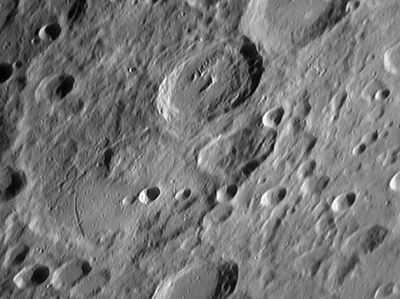Fabricius
Contents
Fabricius
|
Lat: 42.9°S, Long: 42.0°E, Diam: 78 km, Depth: 2.5 km, [/R%C3%BCkl%2068 Rükl: 68], [/Stratigraphy Eratosthenian] |
Table of Contents

Oliver Pettenpaul, Fabricius is the crater on the northern third of [/Janssen Janssen].
Images
LPOD Photo Gallery Lunar Orbiter Images
Maps
([/LAC%20zone LAC zone] 114D2) LAC map Geologic map
Description
Description: Elger
([/IAU%20Directions IAU Directions]) FABRICIUS.--A ring-plain, 55 miles in diameter, with a lofty terraced border, rising on the S.E. to a height of nearly 10,000 feet above the interior. It is partially included by the rampart of [/Janssen Janssen], and the great rill-valley on the floor of the latter appears to cut through its S. wall. There is a long central mountain on the floor, with a prominent ridge extending along the W. side of it. E. of Fabricius (between it and the border of [/Janssen Janssen]) lies a very irregular enclosure, with three distinct craters within it; and on the W., running from the wall to the W. side of [/Janssen Janssen], is a straight narrow valley. Both Fabricius and [/Janssen Janssen] should be viewed under a low morning sun.
Description: Wikipedia
Additional Information
- Depth data from [/Kurt%20Fisher%20crater%20depths Kurt Fisher database]
- Viscardy, 1985: 2.5 km
- Cherrington, 1969: 4.38 km
- [/Central%20peak%20composition Central peak composition]: A, GNTA1 & GNTA2 ([/Tompkins%20%26%20Pieters%2C%201999 Tompkins & Pieters, 1999])
- [/Radar%20bright Radar bright] at 70 cm, thus many boulders and relatively young.
- Exterior impact melt deposits most extensive to S, WSW, max of ~10 km beyond rim. Most extensive ejecta, rays and secondary craters to the SW, with max wall slumping on N side of crater, and topographically lowest rim crest to S ([/Hawke%20and%20Head%2C%201977 Hawke and Head, 1977]).
Nomenclature
- Named for David Fabricius (Latinization of his proper name David Faber or David Goldschmidt) (March 9, 1564 - May 7, 1617), a German theologian who made two major discoveries in the early days of telescopic astronomy: the first known periodic variable star (as opposed to cataclysmic variables, such as novas and supernovas) and evidence that the Sun rotated on its axis.
- The name Fabricius (in his nomenclature list, Fabritius on his map) was given by [/Riccioli Riccioli].
- Although the [/IAU%20Planetary%20Gazetteer IAU Planetary Gazetteer] lists only David Fabricius as an honoree, Riccioli's biographical compendium actually lists two Fabricius's: Paulus Fabricius (a name Riccioli found in Tycho's list of observers of the nova of 1572) and David Fabricius (a name he found cited in Kepler's Ephemerides circa 1615). Although the latter is now much better known to historians than the former, it must be difficult to tell if Riccioli had one or both in mind when he added the name to his lunar list. - JimMosher JimMosher
- Rimae Fabricius (an unofficial name from a dedicated explorer of lunar surface formations for the system of rilles on the floor of Fabricius).
LPOD Articles
Blacky and Wispy.
Fabulous Fab
Crateric Concatenation
Greek Theater Mask
Third Discovery
Young and Old (Fabricius and Metius)
Bibliography
- Hill, Harold. [/A%20Portfolio%20of%20Lunar%20Drawings A Portfolio of Lunar Drawings], page 230 (see also: [/Janssen Janssen]).
This page has been edited 1 times. The last modification was made by - tychocrater tychocrater on Jun 13, 2009 3:24 pm - afx2u2